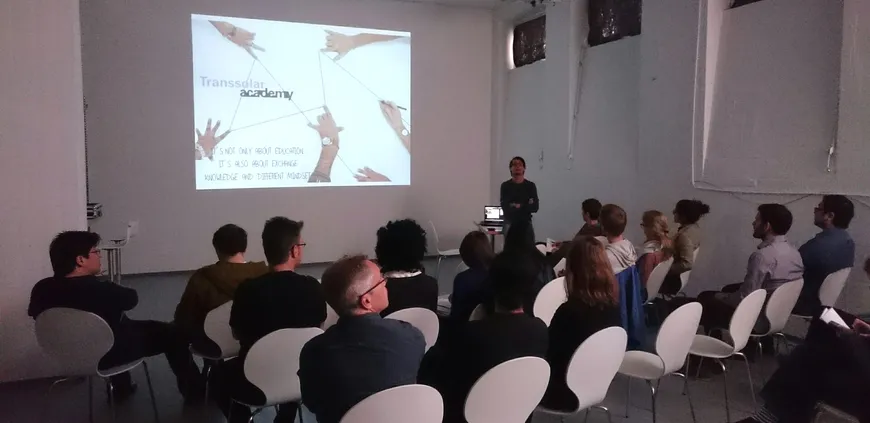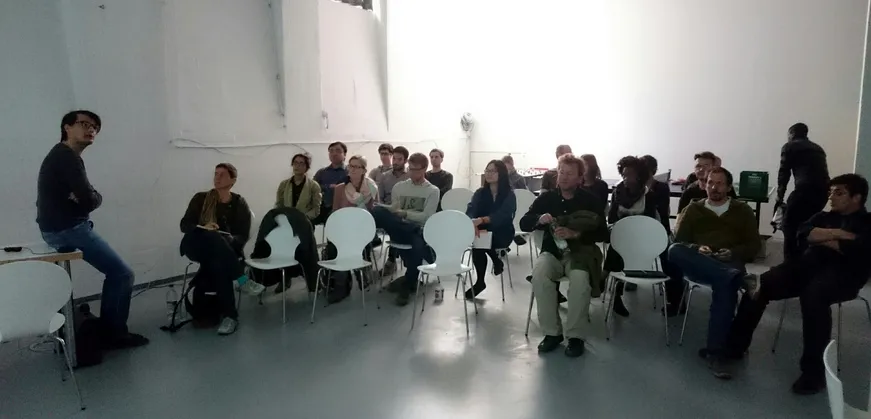Our Academy fellows are at a crucial pivot point in their personal project. They first presented their ideas and vision for an individual project in early December to the Transsolar staff from Stuttgart, Munich, New York and Paris as well as some external guests. Since then, they’ve been busy at work with support from their mentors and the Stuttgart office to materialize their vision using climate engineering expertise.
The fellows were feeling the pressure during March crunch time, nearing the mid-term review. And finally, last Friday, the Academy visited Munich and kicked off a full-day of presentation and discussions in our Munich office’s newly renovated lecture theatre. After 4 months of working in Stuttgart and receiving support mainly from the Stuttgart office, the fellows had the opportunity to present their ideas to a group less familiar with their progress since the initial presentation in December 2016. The Munich office provided critical feedback from a different perspective. For some fellows, it was re-affirming the direction of their project, others had their fundamental vision challenged in a true Transsolar fashion.
In all cases, we had a constructive exchange, both providing feedback to the fellows and learning from them. Whether it’s about how Cubans use their residential housing and their relation to private and public spaces, or the many diverse climate zones in Argentina, from very specific information on fascinating trees native to Zimbabwe, all the way to more abstract ideas like what the invention of algebra and returning to Syria have in common. We had a full day of exchanging ideas!
Solve it by design
We were proud to see the fellows’ ability to connect their social and local context with a broader environmental understanding. For them, “the technical is not a problem”, as Talia Quesada put it, it’s about the interaction between the social and the technological aspects. This led to a vivid discussion to deconstruct what we see and how we see it – How can we see the Microbrigada housing movement in Cuba differently? And what does that mean for a user-centred solution that addresses the overheating, acoustic and privacy concerns of residents by design as opposed to high-cost, high-technology solutions? How can we connect the ageing separated families in North and South Korea in temporary visiting centres at the border while delicately balancing the political tension? And how does the temporary nature of these visiting centres affect the choice of energy supply options and comfort requirements? What about designing an ecovillage in China that balances the future and the past in a present scenario: the need to showcase innovative ecological solutions for future rural housing and leverage proven ideas from Chinese vernacular architecture. And what is driving the heating demand in rural North-eastern China, which currently relies on unsafe but affordable solid fuels (i.e., burning coal and biomass), and how can we turn the driver into an opportunity? Would creating exceptionally comfortable outdoor spaces in Greece bring people back to the diminishing tradition of Agora despite the increasing privatization and urban heat island effect? And how can we determine a performance level for the various elements that create comfortable and livable outdoor spaces (such as trees, shading and water features) and arrange the performance-based elements together in harmony like putting puzzle pieces together?
What our fellows took away from the mid-term review was to allow for iterations in the design process. Performing some initial ‘quick and dirty’ analysis and simulations to explore their initial hypothesis might lead to a position of realizing that the starting hypothesis needs to be changed. Back in December, the fellows proposed a research question regarding a relevant local situation in their home country; now it’s time to go through multiple iterations, refine the research question and find the solution to the refined question in the next 3 months. Stay tuned for more updates on the Academy’s final presentation in June!

